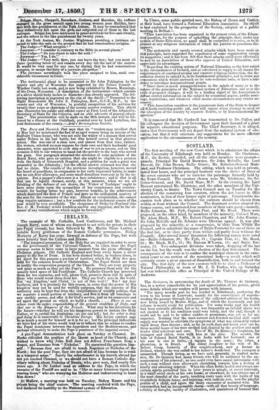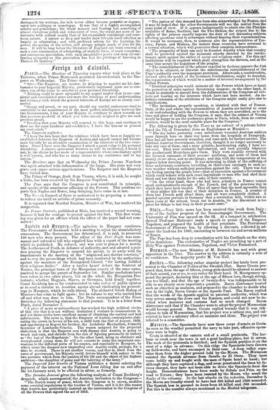SCOTLAND.
,The first meeting of the new Court which is to administer the affairs of the University of Edinburgh was held on Monday. Mr. Gladstone, M.P., the Rector, presided, and all the other members were present— namely, Principal Sir David Brewster, Sir John Melville, the Lord Provost, Dr. John Brown, Bailie Grieve Mr. Solicitor-General Mait- land, and 'Professor Christison. The sitting, which was held in private, halted fotir heurs; and the principal businese was the choice of three of the seven curatordwho are to -*exercise the patronage formerly held by the Town Council. The curators- chosen were Mr. Gladstone, the So- licitor-General, and .Mr. David' Mure, M.P. In the 'evening -the Lord Provost entertained Mr. Gladstone, and the.other memberi of Uni- versity,Court, to dinner. The Tenn Council met on TuesiTay for the election of the remaining four curators, whom the Act loaves in air nomination, in lieu of their former right of patronage. Considerable die- .cussion took place as to whether the curators should be chosen from within or from without the Council. The dominant section adopted the former course, and nominated four members of their own party—namely; Bailie Johnston, Mr. Fyfe Captain Peat, and Mr. Mood. There were proposed, on the other hand, by members of the minority, Colonel Mare, Mr. Adam Black, M.P., 'Mr. Robert Chambers, and Mr. John Hunter ; Sir John Melville and Dr. Schmitz were 'likewise named-. It was also proposed by the minority,- as a- compromise, la -elect iini 1tlilh'the Council, and to substitute the name of Bailie Forrester for one of those on 'the first list, or to- elect partly from within and partly from without the CouridiLa After several hours' discussion the following names were voted on—Bailie Johnston, 38; Mr. Pyle, 31; Captain Peat, 21; Mr. Mood, 21; Mr. Black, M.P., 19; Mr. Duncan M'Laren, 19; and Bailie For- rester, 13. Two subsequent divisions were taken, dropping off the last on the list, but the result was the election of the four first-named. The consequence of the vote is to confine the municipal eliment in the cura- torial court to one section of the municipal body—a result which will certainly create a great amount of dissatisfaction, both in and beyond the city. The first duty of the new curators will be to elect a Professor of Natural Philosophy, in room of Mr. J. D. Forbes, who on Satirday last was inducted into office as Principal of the United College Of St. Andrews.
The Scotsman, in announcing the death of Mr. Thomas de Quincey, has, in a notice remarkable for its just appreciation of his genius, given some details which our readers will peruse with interest.
"For many months past he has resided in Edinburgh, preferring the town to his house at Lasswade, mainly for the convenience of superin- tending the passage through the press of the collected edition of his works, now being issued by Messrs. Hogg, and of which the fourteenth and list volume is nearly ready for publication. For some weeks past his health had been seriously affected, but as he was frequently an invalid alarm was not excited as to his condition until very lately, and the end; though it could not be said to be either sudden or premature, was yet so far un- expected. Nothing that the most earnest and devoted medical' skill could supply was wanted to alleviate the symptoms of what was ultimately rather rapid decay than disease ; and, as far :as such days, and hours ever can be these mortal hours of his were soothed and.eheered by the gentlest and moil tender filial solicitude and care. Two of Mr. De Quincey's daughters, his youngest and eldest, were with him at the close. , The second, the wife of Colonel Baird Smith, is in India with her husband ; one of his sons is also in India,—a captain in the army ; the other, a physician, is in Brazil. The eldest daughter is the wife of Mr. Robert Craig, formerly of this neighbourhood, now a farmer in Ireland, whence she was called to her father's death-bed. The youngest is unmarried. Though living, as we have said, generally in studied seclu- sion, Mr. De Quincey had many friends who will be saddened by the an- nouncement of his removal ; no one could even have casual intercourse with such a man without ever afterwards cherishing towards him a feeling of kindly and admiring interest. When his often feeble health and always un- certain spirits permitted him in later years to mingle, at rarest intervals, in a small social circle at his own house, or elsewhere, he was always one of the most cheerful of the party, touching every topic with the lights of his exquisitely delicate fancy, and enjoying, with catholic zest, now the playful prattle of a child, and again the sharp encounter of matured wits. His conversation had an inexpressible charm—with all that beauty of language, subtlety of thought, variety of illustration, and quaintness of humour that distinguish his writings, his talk never either became pedantic or degene- rated into soliloquy or monologue. It was that of a highly accomplished scholar and gentleman ; his whole manner and bearing had something of almost chivalrous polish and refinement of tone, the result not more of in- tercourse with refined society than of his exquisitely considerate and cour- teous nature. A nature so deep and tender drew towards itself affection as largely as admiration ; and with profound esteem for the learning, the power, the genius of the writer, will always mingle much of love for the man. It will be long before the literature of England can boast renewal of such a rare combination of scholarship, of analytic force, of acute reasoning, and courageous speculation, with such imaginative power and deep all-em- bracing sympathy as this generation has had the privilege of knowing in Thomas De Quincey."



























 Previous page
Previous page